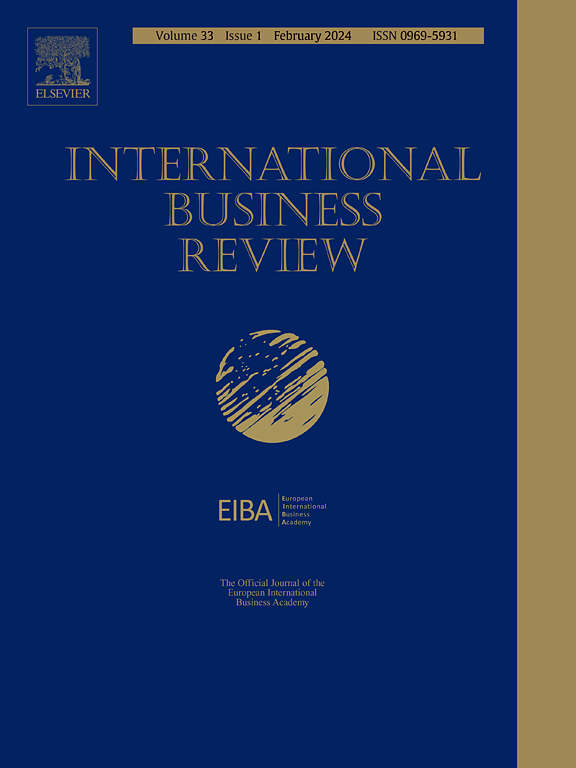Innovate or exploit? Unveiling the international entrepreneurial odyssey through the lens of status quo bias
IF 5.9
1区 管理学
Q1 BUSINESS
引用次数: 0
Abstract
We contribute novel insights into how status quo bias may play a part in identifying and capitalizing on international opportunities, thus addressing a previously overlooked aspect of cognitive perspective in international entrepreneurship research. First, from an entrepreneurial process perspective, we assert that internationalizing firms can attain a performance advantage by adopting Kirznerian and Schumpeterian types of entrepreneurial orientation (EO) with the mediation of opportunity recognition and exploitation. Building on cognitive bias theory, we further posit that status quo bias plays a significant role in shaping the relationship between EO and opportunity recognition and exploitation. We test our hypotheses using survey data collected from 275 internationalizing firms. The empirical results suggest that EO variants exhibit distinct influences and are influenced in unique ways by international opportunity recognition, exploitation and status quo bias. Specifically, we find that a higher level of status quo bias strengthens the relationship between Schumpeterian EO and opportunity recognition, whereas a lower level strengthens the association between Schumpeterian EO and opportunity exploitation. However, no significant effect of status quo bias is found in Kirznerian firms. The study offers both theoretical and practical implications, and provides valuable recommendations for future research.
创新还是利用?通过现状偏见的镜头揭开国际创业的奥德赛
我们对现状偏见如何在识别和利用国际机会方面发挥作用提出了新的见解,从而解决了国际创业研究中以前被忽视的认知视角方面的问题。首先,从创业过程的角度出发,我们认为国际化企业在机会识别和机会利用的中介作用下,采用柯兹纳式和熊彼特式的创业导向(EO)可以获得绩效优势。在认知偏见理论的基础上,我们进一步假设,现状偏见在塑造就业动机与机会识别和利用之间的关系中起着重要作用。我们使用从275家国际化公司收集的调查数据来检验我们的假设。实证结果表明,国际机会认知、利用和现状偏见对企业绩效变异的影响是明显的,并且以独特的方式受到影响。具体而言,我们发现,较高水平的现状偏见强化了熊彼特观点与机会认知之间的关系,而较低水平的现状偏见则强化了熊彼特观点与机会利用之间的关系。然而,在科兹内尔型企业中,没有发现现状偏见的显著影响。本研究具有理论和实践意义,并为今后的研究提供了有价值的建议。
本文章由计算机程序翻译,如有差异,请以英文原文为准。
求助全文
约1分钟内获得全文
求助全文
来源期刊

International Business Review
BUSINESS-
CiteScore
14.10
自引率
6.90%
发文量
95
审稿时长
62 days
期刊介绍:
The International Business Review (IBR) stands as a premier international journal within the realm of international business and proudly serves as the official publication of the European International Business Academy (EIBA). This esteemed journal publishes original and insightful papers addressing the theory and practice of international business, encompassing a broad spectrum of topics such as firms' internationalization strategies, cross-border management of operations, and comparative studies of business environments across different countries. In essence, IBR is dedicated to disseminating research that informs the international operations of firms, whether they are SMEs or large MNEs, and guides the actions of policymakers in both home and host countries. The journal warmly welcomes conceptual papers, empirical studies, and review articles, fostering contributions from various disciplines including strategy, finance, management, marketing, economics, HRM, and organizational studies. IBR embraces methodological diversity, with equal openness to papers utilizing quantitative, qualitative, or mixed-method approaches.
 求助内容:
求助内容: 应助结果提醒方式:
应助结果提醒方式:


